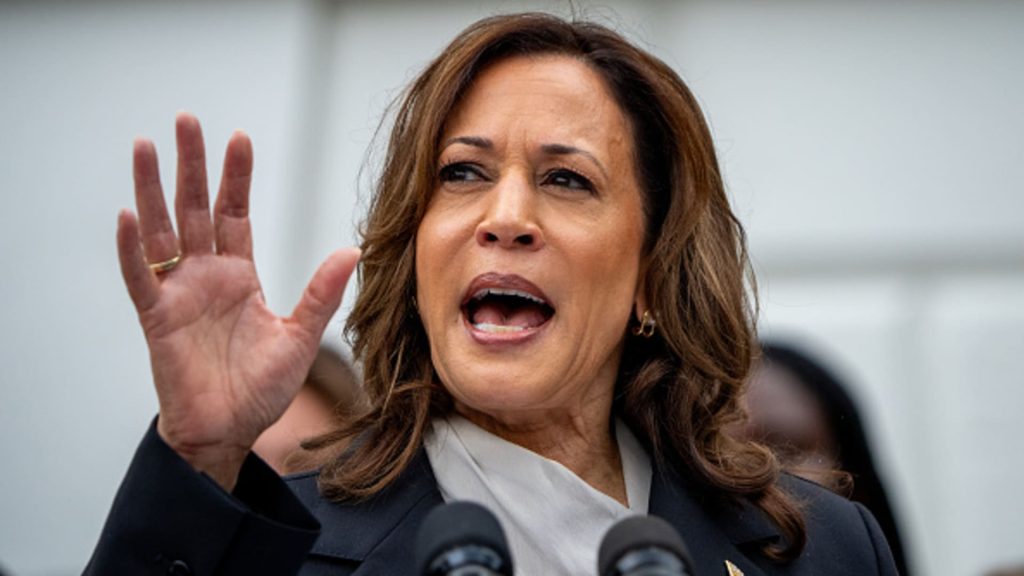As the frontrunner for the Democratic party’s nomination, Kamala Harris will have to run, for better or worse, on President Joe Biden’s economic record. That could be problematic for the vice president, who is being regarded as the near-certain replacement for Biden on the party ticket. While Biden-Harris can lay claim to a number of achievements, their legacy on inflation is what’s being remembered most by voters, who generally pan the administration’s record. It will be just one challenge Harris will have to overcome to defeat her Republican opponent, former President Donald Trump . “She’s got to bear some responsibility since she works works for” the administration, said Greg Valliere, chief U.S. policy strategist at AGF Investments. “It’s going to be hard for her to come up with a new plan, as it could be viewed as disloyal. So she’s really stuck in a bind right now.” Despite historically low unemployment and macro growth that has defied long-held expectations for recession, the economy is Biden’s soft spot. Just 37% of Americans approve of the president’s handling of the economy, according to recent Reuters/Ipsos polling data. That number has moved little in the latter years of the Biden presidency, with consumers revolting over the high cost of pretty much everything even though inflation numbers have eased in recent months. There’s also the debt and deficits problem : Federal red ink has surged about $7.2 trillion under the Biden-Harris watch, an increase of more than 25% as the administration is set this year to run up a budget shortfall approaching $2 trillion. Those issues pose particular problems for Harris, whose economic ideas, assuming she is the Democratic nominee , are expected to mirror what Biden has done for the past three and a half years. “I don’t see a lot of daylight between her views on economic policy and those of the administration,” said Mark Zandi, chief economist at Moody’s Analytics , a Democrat who has advised administrations of both parties. “She was part of the debate and discussion around setting those policies. So they’re her policies.” Positives and negatives Any delineation, he added, would be slight. Harris likely would continue Biden’s efforts on a number of fronts and would be expected to lead the charge to end Trump’s 2017 tax cuts when they sunset in 2025. “Maybe the differences will be around emphasis compared to the president in how things are framed,” Zandi said. “But in terms of the actual policies, in terms of tax policy and policies to address the housing shortage, other cost of living issues, consumer protection to antitrust, I just don’t see a whole lot of difference between the two.” To be sure, Harris will have positives for the economy on which she can campaign. The unemployment rate, though on a gradual upswing, is still at 4.1% , low by historical standards, with nonfarm payrolls rising by more than 1.3 million in 2024 alone. Consumers, who power about two-thirds of the $28.3 trillion American economy, have been resilient as retail sales have climbed 2.3% over the past year, according to numbers adjusted for seasonality but not inflation. But it’s the inflation problem which has been the biggest driver of voter dissatisfaction. The inflation rate as measured by the consumer price index ran at 3% in June , a third of its mid-2022 peak but more than double the 1.4% rate Biden was handed when he took office in 2021. Food costs are up 21% since Biden and Harris took office, energy has soared 33% and the median home price has surged 18.5%. It will be difficult for Harris to run away from that, though she can tout the progress that has been made in taking the inflation rate to its lowest in three years. The Harris campaign did not immediately respond to a request for comment. “The fact that there’s not that much time between now and the election wouldn’t make it particularly feasible to change the economic blueprint in any appreciable way,” said Joseph LaVorgna, who served as chief economist on Trump’s National Economic Council while he was in office. “There’s an economic record that she’ll run on, that she’ll have some claim to, and I think whatever happens in her administration would be effectively, maybe with some pruning on the side here or there, basically to be the one of President Biden’s,” added LaVorgna, who is now chief economist at SMBC Nikko Securities. Possible change at the Fed One area of difference between Biden and Harris could be a crucial one — the Federal Reserve. As a senator back in 2018, Harris voted against confirmation when Trump nominated Jerome Powell to serve as chair of the central bank. She was one of just 13 senators to do so. “At a time when the American people are deeply concerned about an economy that works for everyone and a financial system that is fair and transparent, I have serious concerns about Mr. Powell’s commitment to strengthening rules to protect consumers and ensure the stability of our economy,” Harris said at the time. Biden renominated Powell in 2022 , and the Senate confirmed him by a vote of 80-19. Powell’s term as chair ends in 2026, and it’s unclear whether the 71-year-old policymaker would even want to serve a third four-year stint. Trump already has said he would not give Powell another term , and Harris may look to make a change as well. “A decision not to reappoint Powell wouldn’t necessarily have anything to do with the Fed’s independence but rather a desire not to inherit a Fed chair from two presidents ago,” institutional consulting firm Beacon Policy Advisors said in a report Sunday. Naming a different Fed chair, then, might also not mark a policy difference but rather a desire for a fresh face to head the central bank, which is expected to start lowering interest rates in September. Powell followed a bit more of an unusual path to Fed chair, with a deep financial market background rather than being an economics PhD as most other central banker leaders have been. “My sense is [Harris’ vote against Powell] was just more of a political statement. It was pretty clear he was going to be appointed and her vote wouldn’t make that make a difference one way or the other,” said Zandi, the Moody’s economist. “When she was when she was attorney general in California, she was very aggressive in pursuing financial institutions that went off the rails in the lead up to the to the [financial] crisis, and so she has a very skeptical view of folks who come from Wall Street,” he added.
Read the full article here











